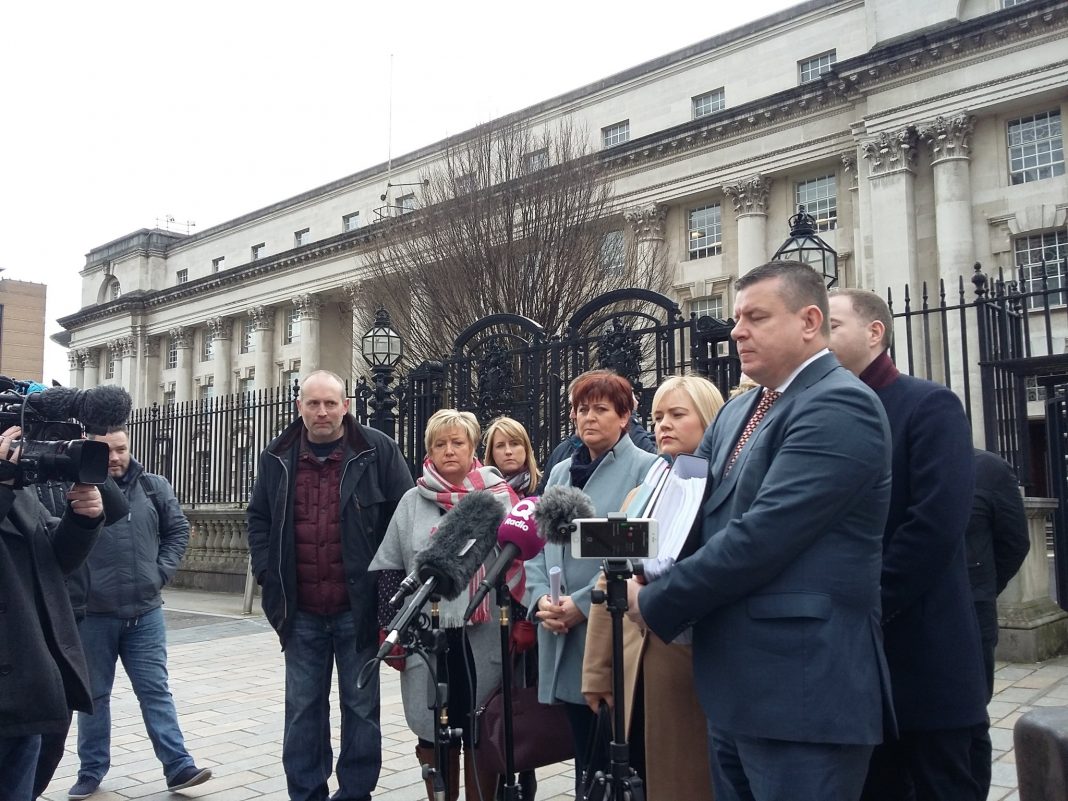A packed court hears a lesson in legal procedure yet the Loughinisland families’ dignity is reaffirmed
By Mike Ritchie, who was at today’s proceedings
The relatives of those killed in the Loughinisland attack by the UVF in June 1994 were in court again today. They were present as “interested parties” to the legal battle between the Police Ombudsman and the former RUC sub-divisional commander Thomas Hawthorne and Raymond White of the Retired Police Officers Association. These latter parties had successfully challenged the Ombudsman’s right to issue his damning public statement on the deficiencies of the RUC in respect of the activities of the UVF in South down in the late 1980s and early 1990s. His findings arose out of his investigation of the complaint by the Loughinisland families relating to the UVF attack on the Heights Bar, Loughinisland in which their relatives were killed.
After his devastating judgment before Christmas, judge Bernard McCloskey had listed today as the day when he would settle costs and remedy for the successful applicants. Having secured the extraordinarily withering judgment of the court, Messrs Hawthorne and White will have expected complete vindication with the quashing of the Police Ombudsman’s report in toto. This would have been a deplorable blow to the way in which the Police Ombudsman saw his role and would have had serious implications for his ability to complete investigations into many other cases.
The court was packed – an indication of the significance of the issues at play. The judge immediately indicated that something was afoot. He said he had been expecting a written application as a new matter was rumoured; then he began to outline how written applications should be structured – what is being sought, for what purpose and on what grounds; he told the court that this is normal practice, “long established, from time immemorial”.
When judges use such phrases, one can generally tell they are not content.
After this lesson, he adjourned the hearing for an hour having indicated that without a written application, lawyers could not expect to raise matters orally. He apologised for the delay to the “large number of people in attendance”, having made it quite clear that the fault for this lay elsewhere.
During the adjournment, it became evident that a major development had taken place; the Ombudsman was now represented by former Director of Public Prosecutions, Barra McGrory. The previous barrister was nowhere to be seen.
When the court reconvened, Bernard McCloskey read through the two applications from counsel for the Police Ombudsman and counsel for the Loughinisland families. The matters they raised were not ventilated in the court. Essentially, the Ombudsman’s new counsel was seeking an adjournment in order to have some time to read himself into the brief after stepping into the role only yesterday afternoon. The families were also seeking a short adjournment as they needed to consider the implications of a new matter that had emerged at a very late stage.
No-one was saying what the new matter was.
The judge re-iterated his “surprise at the casual notice” received yesterday and, once again, noted the “court’s surprise at the abject failure to adhere to basic principles” of court procedure by submitting properly formulated written applications outlining: what is being sought; for what purpose; and on what grounds. These, he said, are “elementary principles of courtesy” to the court.
Having thereby, once again, indicated his displeasure – while still not sharing the new material at the heart of the written applications he had received – he moved, nevertheless to signal his willingness to adjourn “for a short and final period”. He noted that the Loughinisland “families are not opposing a short delay” and, in a welcome move, stated that this ”weighs significantly” in his decision.
He wants any further written material by close of business on Wednesday and the final hearing will take place next Friday morning at 9.45am. He was most insistent this this timetable should be adhered to.
No doubt all will be revealed next week; however it will hardly be a surprise if it is connected to media reports in the Irish Times and the Irish News in the last number of days suggesting that Bernard McCloskey himself may have to consider whether his involvement – as senior counsel – in a previous application for judicial review against the Police Ombudsman by Raymond White and the Retired Police Officers Association places him in position where he could be seen to be predisposed to favour one of the parties in the current case.
Next week will be interesting.
But we should, finally, remember the impact all this has on families; whose satisfaction at the fine work by the Ombudsman in their case remains under threat.
12th January 2018











